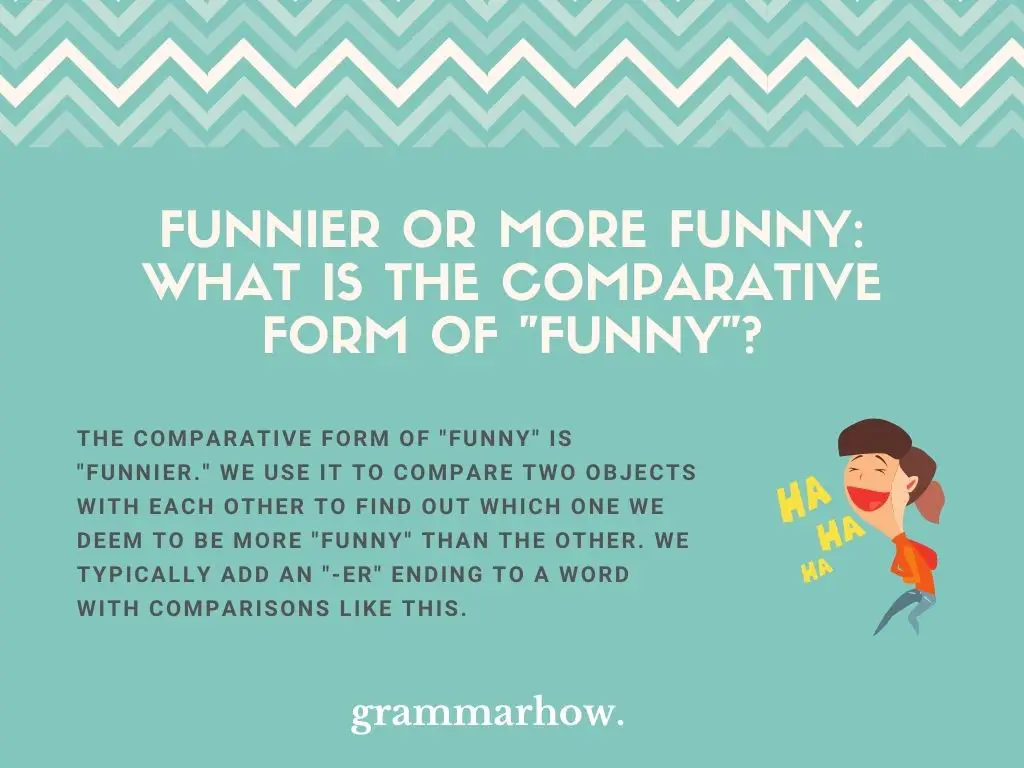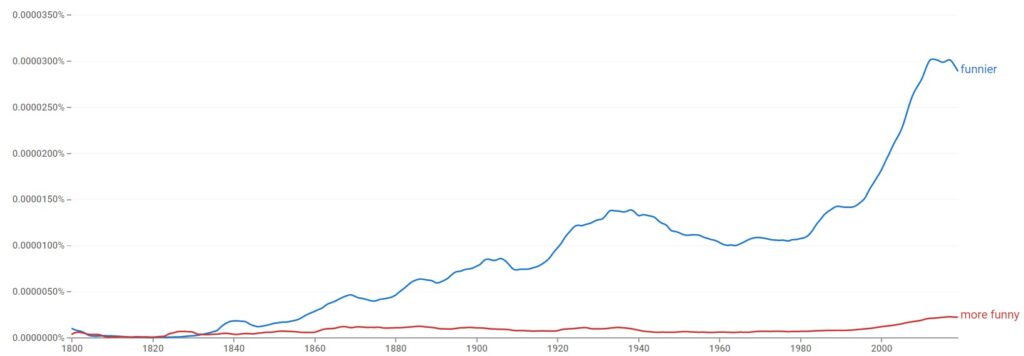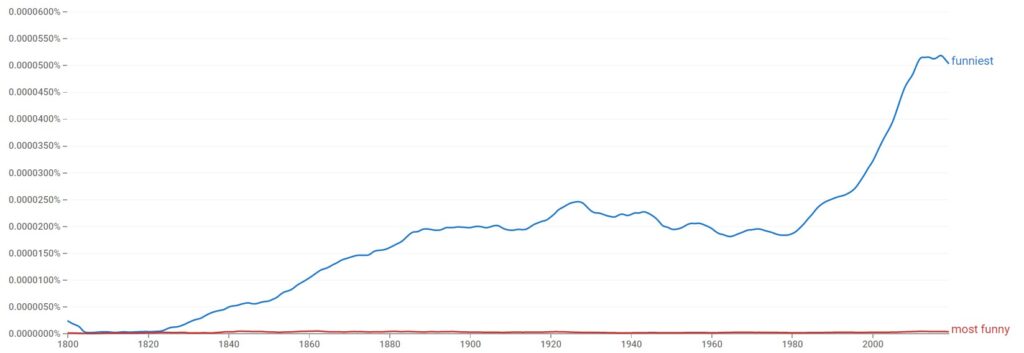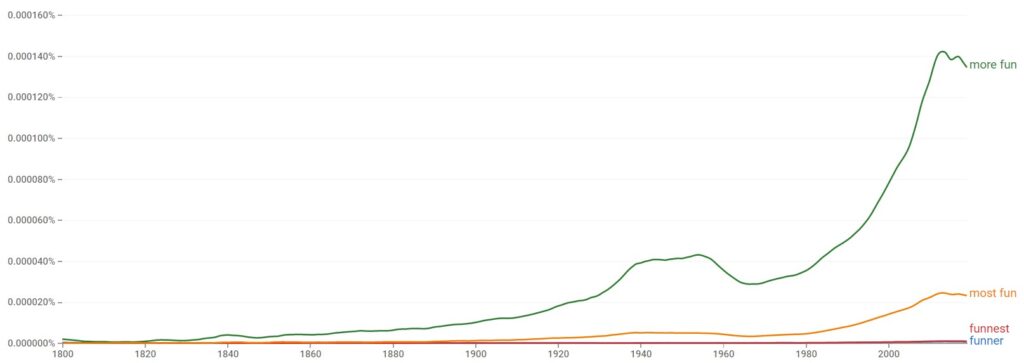What Is the Superlative for Funny
Comparative and superlative forms are important aspects of English grammar. This article will look at the comparative and superlative forms and how they apply to "funny." We will look into "funnier" and "more funny," as well as a few other varieties.
Funnier Or More Funny: What Is The Comparative Form Of "Funny"?
The comparative form of "funny" is "funnier." We use it to compare two objects with each other to find out which one we deem to be more "funny" than the other. We typically add an "-er" ending to a word with comparisons like this.

"Funny" is two syllables, which comes with its own set of rules to follow.
Normal comparative form rules dictate that one-syllable words have an "-er" ending, while multiple-syllable words (three or more) use "more" before the word. For example:
- Harder
- More difficult
However, "funny" is two syllables, which isn't directly covered in the rules. For the most part, two-syllable words follow comparative form rules based on how they sound.
Many native speakers think that "more funny" sounds a bit jarring, which is why it's not used. Instead, we use "funnier" to show that someone or something is more "funny" than another thing.
Technically, "more funny" is not correct, but it's far from popular, and many people avoid it at all costs.
Funniest Or Most Funny: What Is The Superlative Form Of "Funny"?
"Funniest" is the correct superlative form of "funny." This time, we use it to compare more than one item and see which one is the "most" funny of the group. It can refer to a group or two or more, whereas the comparative form only ever refers to two.
We follow similar rules to the comparative form above, where we ignore the "most" starting word because "funny" is a two-syllable word that would sound strange as "most funny."
The rules are similar whether we look at the superlative or comparative forms. We can take the same examples from the above section to show you how the "-est" ending applies to one-syllable words and "most" applies to multiple-syllable words.
- Hardest
- Most difficult
Again, we use "funniest" based on feel rather than any specific grammar rules. It's much cleaner to see a sentence using "funniest" over the alternative "most funny."
While "more funny" is sometimes used because it is technically correct, the same does not apply to "most funny." Many people think it makes no sense, and it's far too jarring in many written forms. Therefore, it is not grammatically correct.
What Are The Different Forms Of "Funny"?
Now that we've seen all the forms that are relevant to the word, it's time to make it a little more comprehensive.
| Word | Funny |
| Comparative | Funnier |
| Superlative | Funniest |
"More funny" and "most funny" are best left unwritten. We tend not to use them as either the comparative or the superlative form, so you should stick with the "-ier" and "-iest" endings of "funny."
How Prevalent Is The Use Of "Funnier" And "More Funny"?
We also have a few graphs that might help make the popularity of the two words clearer to you.
According to Google Ngram Viewer, "funnier" is by far the most popular choice for native writers to use. "More funny" has grown slightly in popularity in recent years, but it's nowhere near the level of "funnier" in all cases.

As you can see, that proves that "funnier" is always the way to go. Many native speakers value it more as the comparative form, which is why we recommend sticking to it.
How Prevalent Is The Use Of "Funniest" And "Most Funny"?
The same graph can be given to you to see how "funniest" and "most funny" compare.
According to Google Ngram Viewer, "funniest" is by far the most popular choice. This time, "most funny" is barely used in comparison, showing that it is far from a top choice for any native speakers to use.

To make sure you get the superlative form correct, just stick with "funniest." There isn't any wiggle room with this form either (unlike the comparative form where "more funny" had a bit of usage).
More often than not, a native speaker will think you've made a grammatical mistake if they see you write "most funny."
Examples Of How To Use The Comparative Form Of "Funny" In A Sentence
Some examples using only the correct forms of each "funny" variation should help you make more sense of it. Once you've read through these, you won't struggle with them again!
- You are funnier than I am, but I'll make sure to make everyone laugh when I can.
- I don't want him to be funnier than me anymore, but I don't know how to stop people from thinking I'm boring.
- I think that this comedian is funnier than that one, though I know that everyone is entitled to their opinions.
- Do you think you're funnier than me? I'd love to see which one of us can get the most laughs in front of an audience!
- We are funnier when we are together, but it doesn't happen all that often, unfortunately.
- They think they're funnier than they are, which is why they always come up with those lame and crude jokes.
- You are not funnier than her, but I appreciate the effort you put into trying.
"Funnier" is the only correct comparative form we use. It works when we are comparing two things with each other to see which is comparatively "more funny" than the other thing.
Examples Of How To Use The Superlative Form Of "Funny" In A Sentence
Check out how the superlative form works as follows:
- Which of your friends would you consider to be the funniest?
- I am by far the funniest member of my family, and everyone knows it too!
- You are the funniest when you are with her, which is why I think you two are made for each other.
- I'm the funniest person in my class, and I always make sure that everyone leaves the lesson with a great big smile on their face!
- You are the funniest person I've ever met, and you should consider taking up a career in comedy.
- She is the funniest girl I've ever had the pleasure of meeting.
- We are the funniest group of people, and I think we should start looking at posting our antics online!
"Funniest" is the only correct superlative form. We use this form when we are comparing multiple items (two or more) together, and whichever one comes out on top ends up being the "funniest" option.
Is It Ever Correct To Use "Funney"?
We've seen all we need to about "funny" and its forms. However, there are a few other common errors that we need to go over to see how they work.
"Funney" is not correct. It's a misspelling of "funny," and it should never be used. You do not need the extra "E" letter before the "Y."
Does "Fun" And "Funny" Mean The Same?
"Fun" and "funny" do not mean the same thing. "Fun" means that someone or something is enjoyable or exciting, while "funny" means that someone or something makes you laugh or is good at telling jokes.
Typically, "fun" people can be a pleasure to be around because they always know the best places to visit and the best things to do.
However, "funny" people can make you laugh easier based on what they say or their actions.
There is plenty of overlap between each word. A "fun" person can be seen as "funny" while they are out doing fun things, and a "funny" person can be "fun" to be around if they consistently make someone laugh.
Is It Ever Correct To Use "Funner" And "Funnest"?
Now that we know the key differences between "fun" and "funny," let's explore the comparative and superlative forms of "fun" a little while we're here.
"Funner" and "funnest" are not correct forms of "fun," according to Google Ngram Viewer. Instead, we should only use "more fun" and "most fun" when we are looking to create the comparative and superlative forms, respectively.

Interestingly, this contradicts what we said earlier. Standard comparative and superlative rules state that one-syllable words need a "-er" and "-est" ending. However, "fun" is a one-syllable word, but this rule does not apply.
Unfortunately, some English words are like this, and they become exceptions to common rules. It's just something you need to understand and work with. Eventually, you'll learn all the major exceptions that you need to focus on.
Here are a few examples to help you remember the correct forms:
- Correct: You are more fun than I am, which is why I think you should take charge of this adventure.
- Incorrect: She is funner than me, and I don't know what I can do to get everyone interested in what I want to do.
- Correct: We have the most fun when we are together, and I couldn't think of anyone out there as a better friend than you.
- Incorrect: You are the funnest person I know, and you always know where to take your friends to treat them to a good time.
You may also like:
"Much" And "Many" – Comparative and Superlative Forms Explained
"More Fair" or "Fairer" – Correct Comparative Revealed
"Sincere" – Comparative and Superlative Forms Explained
Funny Enough or Funnily Enough – Which Is Correct?
Source: https://grammarhow.com/funnier-or-more-funny/
Publicar un comentario for "What Is the Superlative for Funny"